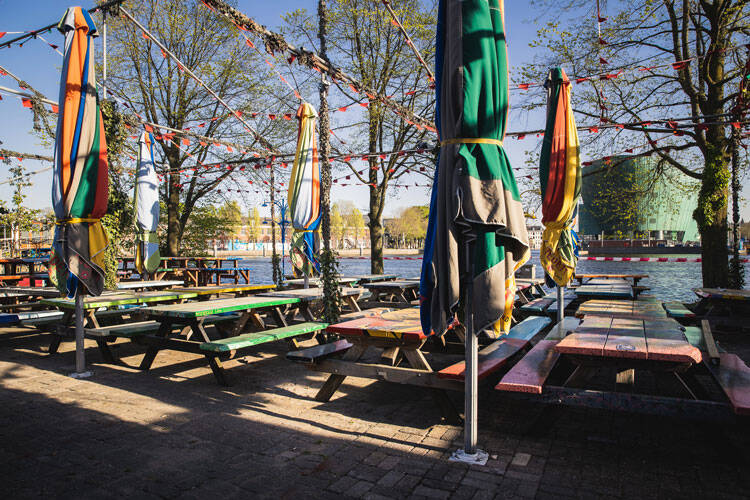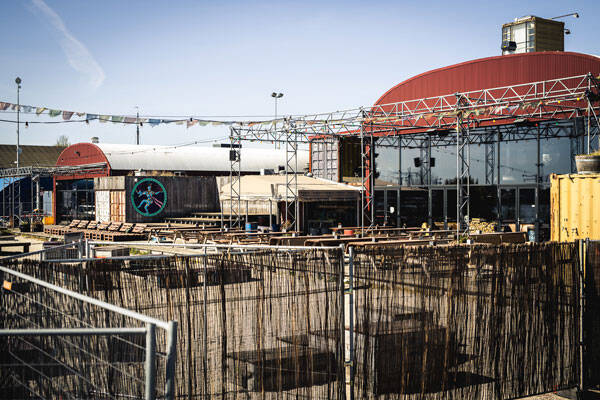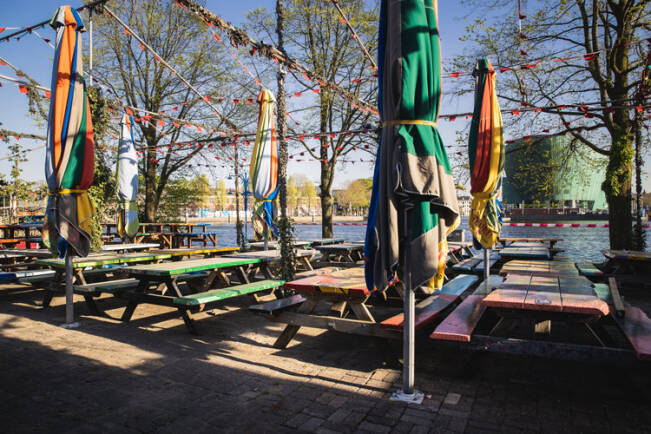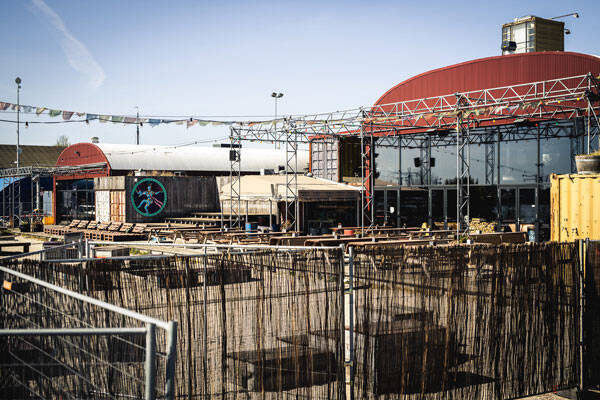












Reflection
At a glance it becomes clear that COVID-19 isn’t just a health crisis, not just a economic crisis. For many foodservice professionals the current time is a moment of spiritual and existential reflection. The system that so many have accepted and thrived in for as long as they can remember has been exposed for the fragile and imperfect thing it is. Once this is over there won’t be a status quo to return to. We cannot in good conscience go back to a system which has failed so many, a system so vulnerable to disruption. The restaurant industry is in need of reinvention. What will that look like? Time will tell.

Eelke Plasmeijer
Founder and chef at Locavore, Bali
“Before all this, it was a normal thing to work fifteen, sixteen hours a day. You never even thought about it. I don’t want that any more. I’m not going to spend sixteen hours a day six days a week in the kitchen. I can’t put my family through that. Cooking may be my passion, but not like that. I want to spend more time at home, with my wife and sons. I’m also shifting to more of an entrepreneur than a chef.”
Jord Althuizen
Founder Smokey Goodness, Netherlands / Belgium
“We’re still here, but it’s a battle. Not just financially speaking, but in energy and drive as well. Each of us chose foodservice because that’s where our passion lies, and you stay in it because success is like a drug. When both the feeling and passion of foodservice, and the financial success are under pressure as they are now, staying motivated is extremely difficult.”
Sarit Packer and Itamar Srulovich
Chef-founders of Honey & Co and Honey & Smoke, London
“The crisis has highlighted things, not least that some of the most important work is done by the least-regarded and least-rewarded people in society. Overnight, the janitors who clean our hospitals, the people who deliver our parcels, stack our supermarket shelves, pick our fruit and manufacture our food were designated “essential workers”. Many are on zero-hour contracts and the minimum wage or less, without any jobs or social security. We’d love to see that change.”

Ravinder Bhogal
Chef-Patron of Jikoni, London
“First, we have to acknowledge that our food system is broken. Thousands face food poverty in the UK, while a staggering amount is wasted. We are focusing on shortening our supply chains and working with producers who protect the environment.”
Daniel Keeling
Co-founder of Noble Rot, the wine and food magazine and restaurant
“It’s easy to foresee the closure of many independent restaurants and the big chains dominating the dining scene — operators only too familiar with the tightest cost-cutting measures and not too concerned with quality. Recovery, whenever it comes, should not just be financial but cultural and spiritual.”
Margot Henderson
Chef-founder of Rochelle Canteen and Rochelle ICA, London
“I think restaurants will start to operate longer opening hours, stretching lunch all day through to dinner. Menus are likely to be smaller and takeaway will still play a big part for many. Landlords should look at rent breaks: no one is currently thinking about profits, just survival.”
“In the future, we can do better by caring more for the world around us. Source local food and order wisely — we don’t want trucks driving across cities with a bunch of parsley because the chef forgot it. We need a bit more of the lockdown spirit: slow down, waste less and care for our communities.”


Voices from foodservice
Even with these valuable insights on-hand, predicting the future is impossible. We live in a time of unprecedented uncertainty. The effect of COVID-19 on the hospitality industry has already been compared to a mass extinction event. Like the asteroid that wiped out the dinosaurs 65 million years ago, COVID-19 is crushing the hospitality industry. Times like these have no experts. Whatever knowledge we do have is insufficient to divine the future. The best way to understand this time is to gather and listen to as many voices as possible. This is a selection of those voices from foodservice itself.
05
Role of value
Consumer perception of value and the prevalence of deals have buoyed some restaurants’ sales during the crisis, as customers—suffering financial losses and fearing continuing financial insecurity—increasingly look for ways to save money.
04
Digital maturity
A strong online-ordering presence, digital loyalty programs, and robust customer-relationship-management (CRM) systems have been lifelines for restaurants during this crisis, as levels of digital engagement among consumers have soared. If trends in China are any indication, consumers could remain more digitally engaged even after the crisis. Starbucks China, for instance, saw a 12-percentage-point increase in the share of digital transactions postcrisis—from 15 percent in January to 27 percent in late March (down from a peak of 80 percent in February).
03
Urbanicity
There are large disparities in restaurant-traffic declines across states. Declines have been highest in densely populated states such as Connecticut and New York.
02
Reliance on day-part occasions
With many people working from home, restaurants that generated much of their business from daytime eating occasions—such as people getting breakfast or coffee on the way to work—have been disproportionately affected.
01
Off-premise versus on-premise sales mix?
Unsurprisingly, restaurants with high off-premise sales prior to the crisis are faring better than those that relied more on dine-in sales.
Consultancy agency McKinsey released a report on the state of the restaurant industry on the 19th of May. In it, they outlined five aspects restaurants must excel in order to survive this monumental crisis.
Hans Steenbergen Floris Heuer Xiao Er Kong
Society is in shock and the economic crisis that is set to follow the current health crisis will badly affect consumer confidence. Consumers are nervous and many businesses in foodservice are financially vulnerable. The economy around going out - theaters, cinemas, restaurants, bars, hotels, catering - has taken a devastating hit. On the other hand, the economy around staying in - DIY stores, online shopping, home cooking, supermarkets - has received a significant boost.
RESTAURANTS HAVE TO FIND A WAY TOWARDS A NEW NORMAL. HOW?
Reinventing the restaurant industry
EXPERT OPINION
5 min
REINVENTING THE RESTAURANT INDUSTRY
Reflection
At a glance it becomes clear that COVID-19 isn’t just a health crisis, not just a economic crisis. For many foodservice professionals the current time is a moment of spiritual and existential reflection. The system that so many have accepted and thrived in for as long as they can remember has been exposed for the fragile and imperfect thing it is. Once this is over there won’t be a status quo to return to. We cannot in good conscience go back to a system which has failed so many, a system so vulnerable to disruption. The restaurant industry is in need of reinvention. What will that look like? Time will tell.












Eelke Plasmeijer
Founder and chef at Locavore, Bali
“Before all this, it was a normal thing to work fifteen, sixteen hours a day. You never even thought about it. I don’t want that any more. I’m not going to spend sixteen hours a day six days a week in the kitchen. I can’t put my family through that. Cooking may be my passion, but not like that. I want to spend more time at home, with my wife and sons. I’m also shifting to more of an entrepreneur than a chef.”

Jord Althuizen
Founder Smokey Goodness, Netherlands / Belgium
“We’re still here, but it’s a battle. Not just financially speaking, but in energy and drive as well. Each of us chose foodservice because that’s where our passion lies, and you stay in it because success is like a drug. When both the feeling and passion of foodservice, and the financial success are under pressure as they are now, staying motivated is extremely difficult.”
Sarit Packer and Itamar Srulovich
Chef-founders of Honey & Co and Honey & Smoke, London
“The crisis has highlighted things, not least that some of the most important work is done by the least-regarded and least-rewarded people in society. Overnight, the janitors who clean our hospitals, the people who deliver our parcels, stack our supermarket shelves, pick our fruit and manufacture our food were designated “essential workers”. Many are on zero-hour contracts and the minimum wage or less, without any jobs or social security. We’d love to see that change.”

Ravinder Bhogal
Chef-Patron of Jikoni, London
“First, we have to acknowledge that our food system is broken. Thousands face food poverty in the UK, while a staggering amount is wasted. We are focusing on shortening our supply chains and working with producers who protect the environment.”
Daniel Keeling
Co-founder of Noble Rot, the wine and food magazine and restaurant
“It’s easy to foresee the closure of many independent restaurants and the big chains dominating the dining scene — operators only too familiar with the tightest cost-cutting measures and not too concerned with quality. Recovery, whenever it comes, should not just be financial but cultural and spiritual.”

Margot Henderson
Chef-founder of Rochelle Canteen and Rochelle ICA, London
“I think restaurants will start to operate longer opening hours, stretching lunch all day through to dinner. Menus are likely to be smaller and takeaway will still play a big part for many. Landlords should look at rent breaks: no one is currently thinking about profits, just survival.”
“In the future, we can do better by caring more for the world around us. Source local food and order wisely — we don’t want trucks driving across cities with a bunch of parsley because the chef forgot it. We need a bit more of the lockdown spirit: slow down, waste less and care for our communities.”
Voices from foodservice
Even with these valuable insights on-hand, predicting the future is impossible. We live in a time of unprecedented uncertainty. The effect of COVID-19 on the hospitality industry has already been compared to a mass extinction event. Like the asteroid that wiped out the dinosaurs 65 million years ago, COVID-19 is crushing the hospitality industry. Times like these have no experts. Whatever knowledge we do have is insufficient to divine the future. The best way to understand this time is to gather and listen to as many voices as possible. This is a selection of those voices from foodservice itself.

05
Role of value
Consumer perception of value and the prevalence of deals have buoyed some restaurants’ sales during the crisis, as customers—suffering financial losses and fearing continuing financial insecurity—increasingly look for ways to save money.
04
Digital maturity
A strong online-ordering presence, digital loyalty programs, and robust customer-relationship-management (CRM) systems have been lifelines for restaurants during this crisis, as levels of digital engagement among consumers have soared. If trends in China are any indication, consumers could remain more digitally engaged even after the crisis. Starbucks China, for instance, saw a 12-percentage-point increase in the share of digital transactions postcrisis—from 15 percent in January to 27 percent in late March (down from a peak of 80 percent in February).
03
Urbanicity
There are large disparities in restaurant-traffic declines across states. Declines have been highest in densely populated states such as Connecticut and New York.
02
Reliance on day-part occasions
With many people working from home, restaurants that generated much of their business from daytime eating occasions—such as people getting breakfast or coffee on the way to work—have been disproportionately affected.
01
Off-premise versus on-premise sales mix?
Unsurprisingly, restaurants with high off-premise sales prior to the crisis are faring better than those that relied more on dine-in sales.
Consultancy agency McKinsey released a report on the state of the restaurant industry on the 19th of May. In it, they outlined five aspects restaurants must excel in order to survive this monumental crisis.
Joost Scholten Xiao Er Kong
Society is in shock and the economic crisis that is set to follow the current health crisis will badly affect consumer confidence. Consumers are nervous and many businesses in foodservice are financially vulnerable. The economy around going out - theaters, cinemas, restaurants, bars, hotels, catering - has taken a devastating hit. On the other hand, the economy around staying in - DIY stores, online shopping, home cooking, supermarkets - has received a significant boost.
RESTAURANTS HAVE TO FIND A WAY TOWARDS A NEW NORMAL. HOW?
Reinventing the restaurant industry
5 min










